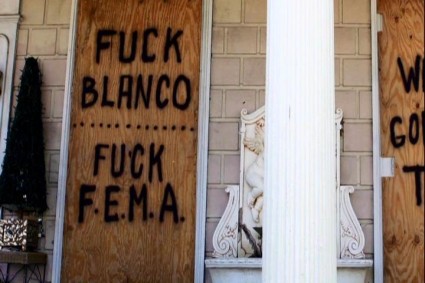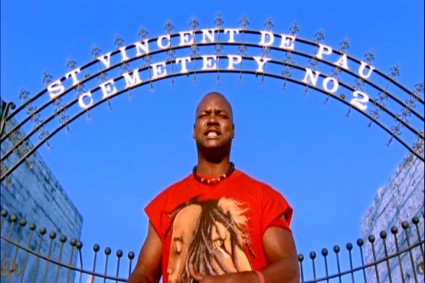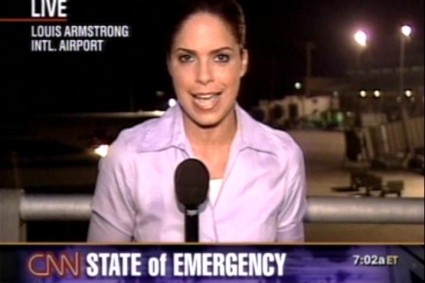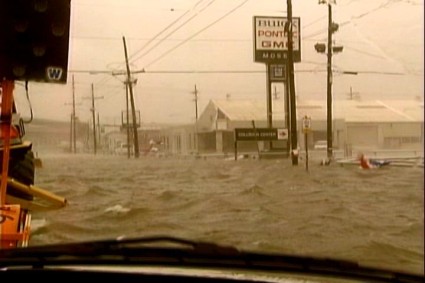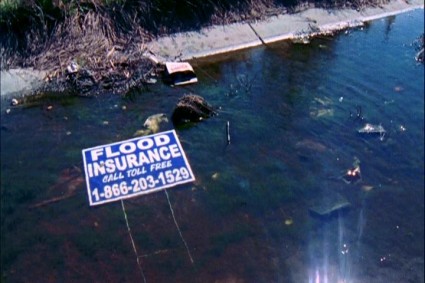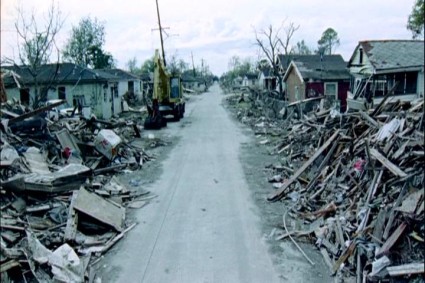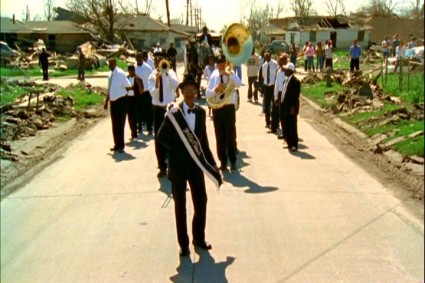BUY IT AT AMAZON: CLICK HERE!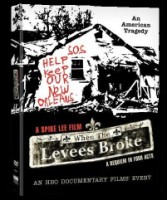
STUDIO: HBO Home Video
MSRP: $29.98
RATED: NR
RUNNING TIME: 256 minutes
SPECIAL FEATURES:
o Available Subtitles: Spanish, French
o Available Audio Tracks: English (Dolby Digital 5.1), Spanish (Dolby Digital 2.0 Stereo)
o The complete four-part documentary on three discs
o Commentary by director Spike Lee
o "Next Movement: Act IV": a 105-minute epilogue featuring new interviews and insights
o "Water Is Rising": A gallery of photos by David Lee with music by Terence Blanchard
[NOTE: More than ever, the citizens of New Orleans are in need of aid. As necessary as the outpouring of relief during the tragedy was, it is needed even moreso now when the spotlight of the media is no longer on the everyday struggles of the citizens trying to rebuild. Here’s a link to Red Cross’s disaster relief fund, and there’ll be another at the end of the article as well as in each picture in the review.]
THE PITCH
“What if, while on foreign soil fighting an abstract concept and policing a self-inflicted state of chaos, American citizens were completely failed by their government at the local and national levels, being left to their own devices in the face of a catastrophic weather event and then not being given the proper supplies and aid to get back on their feet afterward? That would be pretty fucking horrific, wouldn’t it?”
THE HUMANS
Numerous witnesses, survivors, experts and others in some way involved in the devastating event and aftermath of Hurricane Katrina.
THE NUTSHELL
If ever a movie didn’t need so much in the way of background information this would be it, but here it goes anyway: on the morning of August 29th, after a citywide evacuation had been ordered the day before, Hurricane Katrina hit the Louisiana coast and specifically the city of New Orleans. The category three storm with its torrential rain and heavy winds were enough to breach several levees in the New Orleans area, flooding the city and causing catastrophic damage to property and rapidly increasing loss of life. This documentary covers the periods before, during and after the storm and is a testament to a government’s continuing failure to take care of its people in their time of need.
THE LOWDOWN
For such a divisive filmmaker (which is stupid, he’s fucking brilliant*), 2006 was a banner year for Spike Lee. He proved he could make a successful mainstream motion picture while staying true to himself thematically and aesthetically with Inside Man, and also happened to make one of the most powerful works of his storied career with this documentary. It’s the most complete document of what may turn out to be the defining event of this decade for our country (yes, I know we’re stuck in a clusterfuck overseas, but this failure of our own citizens should be the end-all be-all statement on our current administration’s legacy) and a powerful portrait of a city and its peoples in shambles.
The tone of this piece from the get-go is elegiac, and this feeling is only enhanced by the moody and atmospheric score composed by Terrence Blanchard (featuring some cues from Inside Man, too). The entire work is summed up in the bravura opening montage set to “Do You Know What It Means to Miss New Orleans” showing the city in all its glory decades earlier right up to its current demolished state, but at the same time it isn’t. The whole point of the documentary is that a monumental event such as this can’t be broken down into a simple soundbyte or statement by a filmmaker (Lee even says the film feels incomplete at its four hour length), and the only option is to view the entire situation from all angles and get some perspective on New Orleans and its inhabitants.
What will strike some as different from the earlier works of Lee is how even-handed his work is here. He allows all of his interviewees the room to make their own decisions as to what happened and who they feel is to blame and then gives counterpoints to those opinions equal room to breathe in the framework of the documentary. It’s a sign of a great documentary, giving air time to different points of view. One of the main points to take away from this work is to wipe away the misnomer that Hurricane Katrina is responsible for what happened in New Orleans. Lee quite convincingly argues that the real culprit behind the devastation is the Army Corps of Engineers and the sub-par work that they knew was below what was necessary to protect against high-category hurricanes on the levees throughout New Orleans. Had the work simply been average or adequate in that area, New Orleans would’ve never been underwater in the first place.
Another beautiful thing about Lee’s work on this documentary is how understated it is. In a situation that was tailor-made to be an examination of racism/class discrimination that some could interpret as polemical (again, stupid, this is clearly a situation that has to be looked at as racial/class-based, just remember the media coverage of the looting playing into the worst stereotypes possible) leaves his voice out at almost all times of the interviews and allows the victims and experts to speak for themselves, creating a work that manages to be both intimate and panoramic. An unexpected byproduct of this is the humor that comes out of the people of New Orleans: they may have been beaten down by the events of Katrina, but their spirits are still strong and they still believe that New Orleans will be rebuilt, even if the government isn’t going to help them. The cumulative effect of this film is devastating; over the four hour running time one viscerally feels the repeated and emphatic failing of the people of New Orleans by the government at the local, state, and national level throughout the crisis situation.
And this isn’t just based on the inexcusably slow reaction time for FEMA and the government to get the fuck into the city of New Orleans, it’s a failure that is continuing up until today where these people are not being given the proper payments from insurance companies that are looking for any possible loophole to escape payment through, and the government not getting the people of New Orleans operable trailers or the clean-up crews necessary to start to make the city inhabitable again. It’s an infuriating indictment of our government’s ineptitude in time of crisis that is heartbreakingly human. A brilliant work by one of the best (getting better with age, as it were) directors in America. Highest possible recommendation.
*Except for his continued support of the Isiah-era Knicks, David Lee’s board-rackin’ excluded.
THE PACKAGE
The cover art is simple and strangely beautiful, more or less reflecting the nature of the documentary itself. The four acts are spread out over the first two discs with the Act V and ‘Water is Rising’ features being included on the final disc, all of which fold out from the DVD packaging (handsome packaging for a multi-disc set, if not a little unwieldy for a DVD shelf). The picture quality and audio are both solid (but as is to be expected with a documentary utilizing numerous different sources, there are varying degrees of quality to both the video and audio). There isn’t a deluge of various different extras, but what’s here is pretty substantial. Lee contributes commentary to all four hours of the documentary and the results are predictably hit and miss. One can’t expect a commentary to be consistently illuminating and/or interesting for four hours, but for those who were missing Lee’s voice in the film itself will get more than enough of it here (and what’s more, he’s pretty goddamned funny for long stretches in here).
To call Act V an epilogue is sort of misleading, as it’s basically a bunch of ancillary interviews edited together that didn’t fit into Levees for whatever reason. It shows, too, as some of the interviews are weaker, but it’s still powerful stuff that will have you completely engrossed a few minutes into it. Perhaps the most successful extra is the short piece ‘Water is Rising’ with its stark photographic images of Hurricane Katrina and its aftermath set to the somber music composed by Terrence Blanchard. In the case of a DVD like this, all of these features are icing on the cake. The documentary is worth the cost of the set alone.
[NOTE: More than ever, the citizens of New Orleans are in need of aid. As necessary as the outpouring of relief during the tragedy was, it is needed even moreso now when the spotlight of the media is no longer on the everyday struggles of the citizens trying to rebuild. Here’s a link to Red Cross’s disaster relief fund, and there’s another as the top of the article as well as in each picture in the review.]
9.5 out of 10
